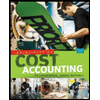
A.
Payroll: The total payment that a company is required to pay to its employee for the services received is called as payroll.
Payroll withholding deduction: The amounts which the employer withheld from employees’ gross pay to deduct taxes such as federal income tax, state income tax, local income tax, and social security tax are called payroll withholding deduction.
Employer payroll taxes: The taxes which the employer must pay to the employees with their salaries is called employer payroll taxes. Such taxes are not withheld from employees’ gross earnings but instead they are paid by employer.
To Journalize: The entry to payroll for the week of April 29.
B.
To Journalize: The payroll taxes expense incurred for the week of April 29.
Trending nowThis is a popular solution!

Chapter 11 Solutions
Bundle: Accounting, Loose-leaf Version, 27th + CengageNOWv2, 2 terms Printed Access Card
- Can you help me solve this financial accounting question using the correct financial procedures?arrow_forwardHow can I solve this financial accounting problem using the appropriate financial process?arrow_forwardI need help with this general accounting problem using proper accounting guidelines.arrow_forward
- Please provide the solution to this financial accounting question with accurate financial calculations.arrow_forwardPlease explain the solution to this general accounting problem using the correct accounting principles.arrow_forwardCan you explain the correct methodology to solve this general accounting problem?arrow_forward
- Can you solve this financial accounting question with the appropriate financial analysis techniques?arrow_forwardI need the correct answer to this general accounting problem using the standard accounting approach.arrow_forwardPlease give me true answer this financial accounting questionarrow_forward
 College Accounting (Book Only): A Career ApproachAccountingISBN:9781337280570Author:Scott, Cathy J.Publisher:South-Western College Pub
College Accounting (Book Only): A Career ApproachAccountingISBN:9781337280570Author:Scott, Cathy J.Publisher:South-Western College Pub Principles of Cost AccountingAccountingISBN:9781305087408Author:Edward J. Vanderbeck, Maria R. MitchellPublisher:Cengage Learning
Principles of Cost AccountingAccountingISBN:9781305087408Author:Edward J. Vanderbeck, Maria R. MitchellPublisher:Cengage Learning College Accounting (Book Only): A Career ApproachAccountingISBN:9781305084087Author:Cathy J. ScottPublisher:Cengage Learning
College Accounting (Book Only): A Career ApproachAccountingISBN:9781305084087Author:Cathy J. ScottPublisher:Cengage Learning Financial And Managerial AccountingAccountingISBN:9781337902663Author:WARREN, Carl S.Publisher:Cengage Learning,
Financial And Managerial AccountingAccountingISBN:9781337902663Author:WARREN, Carl S.Publisher:Cengage Learning, Financial AccountingAccountingISBN:9781337272124Author:Carl Warren, James M. Reeve, Jonathan DuchacPublisher:Cengage Learning
Financial AccountingAccountingISBN:9781337272124Author:Carl Warren, James M. Reeve, Jonathan DuchacPublisher:Cengage Learning College Accounting, Chapters 1-27 (New in Account...AccountingISBN:9781305666160Author:James A. Heintz, Robert W. ParryPublisher:Cengage Learning
College Accounting, Chapters 1-27 (New in Account...AccountingISBN:9781305666160Author:James A. Heintz, Robert W. ParryPublisher:Cengage Learning





